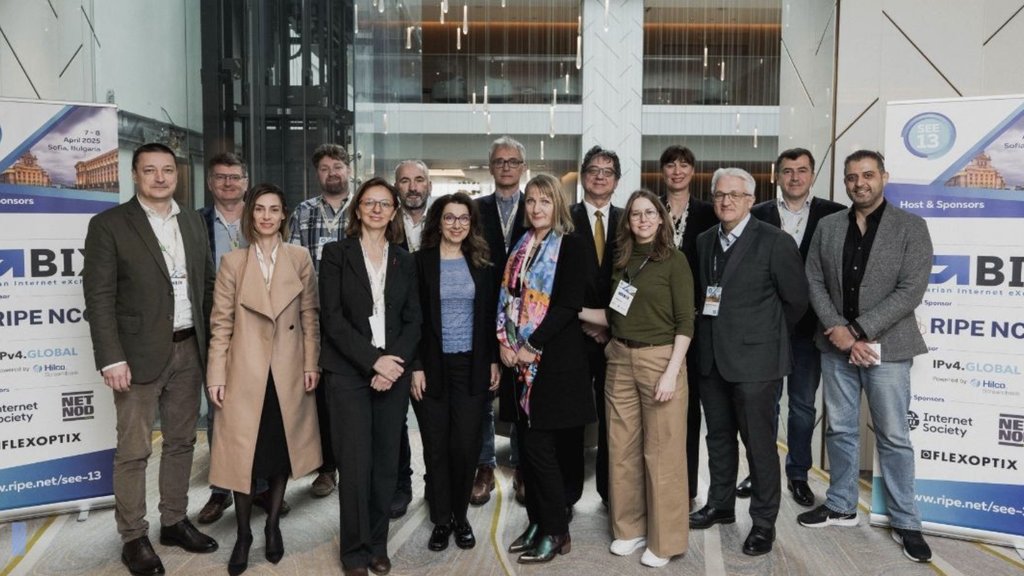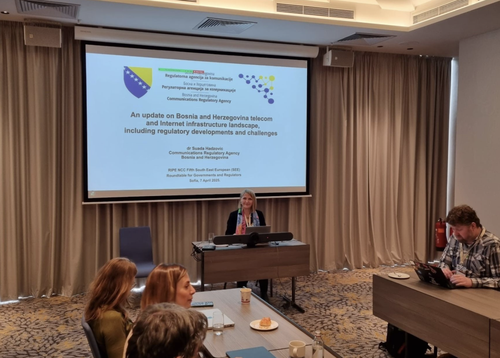Meeting Report

On 7 April 2025, the RIPE NCC hosted the fifth South East Europe (SEE) Roundtable Meeting in Sofia, Bulgaria.
The event included operational updates from the region, EU policy regulation updates and the RIPE NCC’s regional IXP research.
Nine government representatives from the SEE region took part in the event, including officials from various Ministries of Foreign Affairs and national telecommunications regulators from Bosnia and Herzegovina, Romania, Montenegro, Albania, and Serbia. A representative from the telecommunications administration in Kosovo also participated.
Participants from Lithuania, Canada, Belgium, Greece, Switzerland, and the United Kingdom brought international perspectives to the event.
Opening and Key Discussions
Mirjam Kühne, RIPE Chair, opened the meeting by stating the importance of continued dialogue between technical and governmental stakeholders to address the region’s evolving Internet landscape.
Hisham Ibrahim, RIPE NCC Chief Community Officer, welcomed everyone and highlighted the crucial role of regional Internet governance bodies such as the RIRs, ICANN, and the IETF in maintaining the global, interoperable Internet.
He talked about network scalability without over-reliance on legacy systems like IPv4, advocating for more sustainable infrastructure development. Hisham also noted the need for enhanced routing security (including RPKI), network resilience through greater use of Autonomous System Numbers (ASNs), increased interconnection, and the growth of Internet Exchange Points (IXPs) across the region.
Desiree Miloshevic, Co-chair of the RIPE Cooperation Working Group, welcomed the roundtable participants and Hans Petter Holen, RIPE NCC Managing Director.
SEE Operational Insights and Updates
Desiree Miloshevic presented updated statistics from the SEE region, LIR and membership growth, offering insights into operational trends based on RIPE NCC’s data. She talked about the rate of RPKI adoption, the importance of securing government traffic and IP resource allocations and transfer trends.
Referencing the European Commission’s DESI 2022 report, she noted that while the SEE region continues to lag slightly behind the EU average in digital performance, national ambitions for digital transformation remain strong.
Desiree also touched upon the Internet measurements topic. RIPE Atlas measurements showed broader reachability of K-root servers, aiding infrastructure reliability. There was increasing activity in IPv4 address transfers, highlighting continued high demand despite exhaustion. IPv6 capability (measured by the announcements of IPv6 in the global routing) was improving, but the actual adoption (measured by end-user traffic) remains very low across SEE, except in Greece, Romania, and to some extent Bulgaria.
For more data, she pointed to the RIPE NCC labs article by Qasim Lone.
RIPE NCC’s IXP Research in the SEE Region
Jelena Cosic, the RIPE NCC, shared insights into recent RIPE NCC research on Internet Exchange Points (IXPs) in the SEE region, highlighting trends in traffic distribution, emerging peering practices, and the strategic role of IXPs in boosting regional connectivity.
IXPs in South-East Europe are vital for local traffic exchange, improving latency, bandwidth efficiency, and resilience. However, their development and usage remain uneven across the region due to differing national strategies, regulatory frameworks, and market structures.
IXPs in SEE operate under various governance models, ranging from ISP associations and non-profits to academic or government entities. Most face operational challenges, including lack of dedicated staff, budget constraints, and limited investment in infrastructure upgrades. Despite physical proximity to large European data hubs (e.g. Vienna, Frankfurt), over-dependence on them draws economic value out of the region and inhibits local IXP traffic growth.
While IXPs are not subject to licensing requirements, new cybersecurity obligations under the NIS 2 Directive impose stricter security requirements on IXPs, DNS operators, and cloud services.
Jelena concluded in her presentation that a robust regional IXP ecosystem is essential for a resilient Internet and enhances latency, availability, and cost-efficiency. It also positions SEE countries more attractively for global content providers, public services, and cloud platforms.
Regional Infrastructure Developments: Bosnia and Herzegovina

Dr. Suada Hadzovic, the Communications Regulatory Agency of Bosnia and Herzegovina, provided a brief update on national telecom infrastructure developments with an emphasis on collaboration with regulators in the region. She provided insights into the positioning of the country with regard to neighbouring countries in terms of network readiness and 5G regulation.
EU Regulations Update
A joint briefing by Romain Bosc, RIPE NCC, who joined remotely, and Elena Plexida, ICANN, provided an overview of recent EU regulatory trends and ongoing developments. Romain highlighted that the rising geopolitical volatility has led the new European Commission to prioritise security, resilience, and technological sovereignty. The implementation of the NIS2 Directive and the Cyber Resilience Act (CRA), alongside upcoming reviews of both the EU’s internal security and overall cybersecurity strategy, are significant items on the agenda.
Another significant trend is the push towards more competitiveness and regulatory simplification, as the EU prepares to review its overall single market strategy. As the EU aims to become a more attractive place for investment and innovation, the European Commission is also about to review key digital policy files, such as the Digital Services Act (DSA), and is preparing for a potential reform in telecoms, through the announced Digital Network Act (DNA) initiative. Finally, the EU is expected to establish an official position ahead of the WSIS+20 review and reaffirm its commitment to a multistakeholder approach to Internet governance.
Elena Plexida added that the EU was navigating a changing world order. She spoke about the importance of safeguarding a collaborative approach with relevant international partners to strengthen the multistakeholder approach. She emphasised the important role of regional engagement and the good collaboration with the RIPE NCC in this regard.
Open Fibre Data Standard
Steve Song, Internet Society, who joined remotely, introduced the Open Fibre Data Standard (OFDS) initiative, underlining its potential to enhance infrastructure transparency, accountability, and investment strategies in underserved areas.
Preparations ahead of the IGF 2025 and WSIS +20
Anja Gengo, the UN IGF Secretariat (joined remotely), discussed opportunities for regional engagement in shaping the agenda of the 2025 Internet Governance Forum and the WSIS+20 review process, encouraging increased multi-stakeholder participation.
Preparing the Next World Telecommunication Development Conference
Ms. Inga Rimkevičienė, RRT Lithuania (joined remotely), outlined preparatory efforts for the upcoming World Telecommunication Development Conference (WTDC), focusing on regional digital priorities and development cooperation.
Roundtable Discussion and Feedback
Participants provided satisfactory feedback, but also confirmed some of the regional priorities and opportunities for improved collaboration among regulators and the technical community. Expressions of interest to host future SEE Roundtable meetings were received from Kosovo and Montenegro.
The event concluded with a summary of key takeaways and a call to action for continued engagement, followed by a networking lunch.